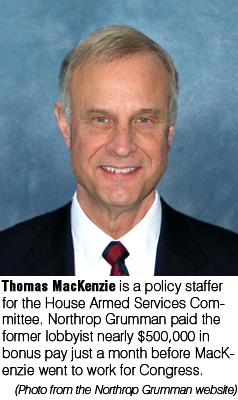This article was originally published by Republic Report and is re-posted here with permission.
 Northrop Grumman, the fourth largest weapons maker in the world, follows the actions of Congress very closely. The F-35, which may cost over $1.45 trillion because of unprecedented cost overruns, an expensive surveillance drone program criticized as unnecessary, and even a new fleet of nuclear bombers are among the Northrop Grumman products that may be in jeopardy as the Pentagon is forced to trim fat from the military budget. But luckily for Northrop Grumman, which made $2.12 billion in profits last year, the firm essentially has a man on the inside of Congress with wide sway over how the government spends money on national defense.
Northrop Grumman, the fourth largest weapons maker in the world, follows the actions of Congress very closely. The F-35, which may cost over $1.45 trillion because of unprecedented cost overruns, an expensive surveillance drone program criticized as unnecessary, and even a new fleet of nuclear bombers are among the Northrop Grumman products that may be in jeopardy as the Pentagon is forced to trim fat from the military budget. But luckily for Northrop Grumman, which made $2.12 billion in profits last year, the firm essentially has a man on the inside of Congress with wide sway over how the government spends money on national defense.
In 2011, after Republicans seized the House of Representatives in a landslide victory, the House Armed Services Committee, which oversees the military, gained a new chairman, Representative Buck McKeon (R-CA). As with most leadership changes, McKeon and his committee hired new professional staff. Thomas MacKenzie, a vice president at Northrop Grumman, was tapped to work for the committee beginning in March of 2011.
There are many examples of lobbyists burrowing into government to work in policy areas that impact their former employers. These lobbyists, as Public Citizen’s Craig Holman, an expert on lobbying, has explained, seem happy to accept low-paid public service salaries, perhaps because they can expect extremely high pay once they return to K Street.
In MacKenzie’s case, Northrop Grumman made sure he had extra cash before he went to work writing policy on the defense budget. Republic Report viewed a recently filed an ethics disclosure form, and found that Northrop Grumman paid MacKenzie a $498,334 bonus in 2011, just before he went to work under McKeon as a committee staffer. The bonus was almost the size of MacKenzie’s annual salary at the firm, which was $529,379 in 2010. [View a copy of the disclosure here.]
Neither MacKenzie nor the House Armed Services Committee communications director responded to multiple requests for comment from Republic Report. As a congressional staffer, MacKenzie now makes close to $100,000 a year.
Representative McKeon, by far the biggest recipient of Northrop Grumman campaign contributions in Congress, has defended billions of dollars in questionable projects for MacKenzie’s former employer. McKeon has fought to cancel the retirement of the Northrop’s RQ-4 Global Hawk, a drone the Pentagon could save $2.5 billion by cutting. He’s pressed to secure funding for a range of different aircraft developed by Northrop Grumman, from a new nuclear-capable long-range bomber to the F-35, which is slated to be the most expensive weapon developed in human history. Earlier this year, McKeon visited a Northrop plant and rallied employees to help him stave off nearly $500 billion in sequestration cuts to the defense budget as part of the deficit-reduction deal.
William Hartung, author of Prophets of War and a senior fellow at the New America Foundation, told Republic Report that the “circumstances around [MacKenzie’s] bonus is at best suspicious.” Hartung, a noted critic of wasteful military spending, said the “reverse revolving door”—where lobbyists become government officials—can have a “pernicious affect” on public policy.
MacKenzie’s career includes stints in the military, government and the private sector. According to a press release from Northrop Grumman, MacKenzie worked first as an aviator with the US Navy, then as a senior policy staffer with the Senate Armed Services Committee. In 2005, he went to work for Northrop Grumman. Lobbying disclosures show that MacKenzie was part of a team that lobbied on over fifty weapons systems, including many of the programs he now oversees as a staffer under McKeon.
Reached for a comment, a Northrop Grumman public affairs representative simply told us: “Under company policy, I can only confirm that Mr. Mackenzie was an employee of Northrop Grumman.”
Republic Report intern Nick Lyell contributed to this post.


